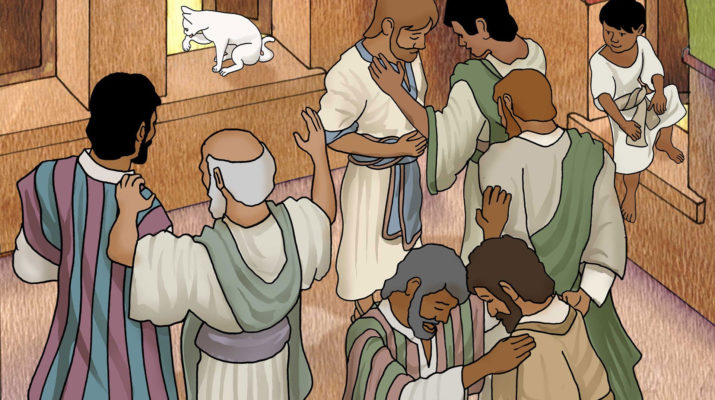1 Timothy 2:1-7
Ordinary C43
1 First of all, then, I urgeA that supplications,B prayers,C intercessions,D
A “urge” = parakaleo. From para (beside, by, in the presence of) + kaleo (to call by name, invite, to name, bid, summon, call aloud) {related to keleuo (to command, order, direct); from kelomai (to urge on)}. This is to call to, summon, invite, request, or beg. It can also be exhort or admonish. Also, this can be encourage, comfort, or console. This word has legal overtones and is used of one’s advocate in a courtroom. It is the root of the name of the Holy Spirit “paraclete” is our advocate and comforter.
B “supplications” = deesis. 18x in NT. From deomai (having an urgent need because one is missing or needing something so it is an earnest appeal or pressing request); from deo (to tie, bind, fasten, impel, compel; to declare something against the law or prohibited). This is a request coming from a deep personal need or want. So, it is supplication or prayer.
C “prayers” = proseuche. From proseuchomai (to pray or pray for, to worship or supplicate; more literally exchanging one’s own wishes for God’s); {from pros (advantageous for, at, toward) + euchomai (to wish, make a request, pray)}. This is prayer, worship, or a place where one prays.
D “intercessions” = enteuxis. 2x in NT. From entugchano (to encounter, appeal, please, chance upon, confer with, to meet someone in order to consult with them); {from en (in, on, at, by, with, among) + tugchano (root means to become ready; to hit, meet, happen, obtain, chance, perhaps; properly, to hit the mark or be spot on; the opposite of the Greek word for sin hamartano, which literally means to miss the mark); {perhaps from tucho (to make ready, bring about)}}. This is petition or intercession. It can be a request made to the king, a petition for intervention, or a prayer.
and thanksgivingsE be madeF for everyone,G
E “thanksgivings” = eucharistia. 15x in NT. From eucharistos (thankful, well favored); {from eu (good, well, well done, rightly) + charis (grace, kindness, favor, gratitude, thanks; being inclined to or favorable towards – leaning towards someone to share some good or benefit; literal, figurative, or spiritual; grace as abstract concept, manner, or action); {from chairo (to rejoice, be glad or cheerful; a greeting); from char– (to extend favor, lean towards, be inclined to be favorable towards)}}. This is thankfulness or thanksgiving. It is active gratitude. It is related to the word “eucharist.”
F “made” = poieo. This is to make, do, act, construct, abide, or cause.
G “everyone” = pas + anthropos. Pas is all or every. Anthropos is probably from aner (man, male, husband) + ops (eye, face); {from optanomai (to appear, be seen); perhaps from horao (become, seem, appear)}. This is human, humankind. Used for all genders.
2 for kingsH and all who are in high positions,I so that we may leadJ
H “kings” = basileus. Probably from basis (step, hence foot; a pace); from baino (to walk, to go). This is king, emperor, or sovereign.
I “high positions” = huperoche. 2x in NT. From huperecho (to hold above, surpass, governing, high quality or value.; to have beyond, excel); {from huper (by, under, over, above, under the authority of another) + echo (to have, hold, possess)}. This is prominence, authority, excellence. It can be elevated or having a superior social standing or character.
J “lead” = diago. 2x in NT. From dia (through, across to the other side, thoroughly) + ago (to lead, bring, carry, guide, drive, go). This is to pass, spend time, live.
a quietK and peaceableL lifeM in all godlinessN and dignity.O
K “quiet” = eremos. 1x in NT. Perhaps from eremos (properly, a place that is not settled or farmed, not populated; could be a deserted area or a desert place; secluded, solitary, or lonesome; any kind of vegetation is sparse, but so are people generally). This is quiet or undisturbed, tranquil.
L “peaceable” = hesuchios. Related to “high positions” in v2. 2x in NT. From hesuchos (still or quiet) OR from hedraios (sitting, well-seated, immovable; figuratively, steadfast, firm, morally fixed); {from hedra (seat) + echo (see note I above)}. This is peaceful or tranquil, inner calm.
M “life” = bios. 10x in NT– including the widow’s mite story where she gave all she had to live on in Mark 12:44 and Luke 21:4. This is physical life, livelihood, goods, or the way one lives one’s life.
N “godliness” = eusebeia. Related to “thanksgivings” in v1. 15x in NT– 1x in Acts, 8x in 1 Timothy, 1x in 2 Timothy, 1x in Titus, and 4x in 2 Peter. From eusebes (pious, devout, respectful); {from eu (see note E above) + sebomai (to worship, revere, adore, hold in high regard or in awe; veneration shown by a devout one)}. This is piety, devotion – showing reverence.
O “dignity” = semnotes. Related to “godliness” in v2. 3x in NT. From semnos (honorable, dignified, series; what is weighty or highly respected – seen as majestic); from sebomai (see note N above). This is dignity, gravity, honor, reverence.
3 This is rightP and is acceptableQ in the sight ofR GodS our Savior,T
P “right” = kalos. This is good, noble, beautiful, correct, or worthy. This is external signs of goodness like beauty, demonstrations of honorable character, showing moral virtues. A different word, agathos, speaks of intrinsic good.
Q “acceptable” = apodektos. 2x in NT. From apodechmai (to welcome, embrace, receive, approve of; to show hospitality); {from apo (from, away from) + dechomai (to warmly receive, be ready for what is offered, take, accept, or welcome; to receive in a literal or figurative sense)}. This is acceptable, welcomed, agreeable.
R “in the sight of” = enopios. Related to “everyone” in v1. From en (in, on, at, by, with) + ops (see note G above). This is literally “in sight of.” It means before in a literal or figurative sense.
S “God” = Theos. From Proto-Indo-European origins, meaning do, put, place. This is God or a god in general.
T “Savior” = Soter. From sozo (to save, heal, preserve, or rescue. Properly, this is taking someone from danger to safety. It can be delivering or protecting literally or figuratively); from sos (safe, rescued, well). This is savior, deliverer, preserver.
4 who desiresU everyone to be savedV and to come to the knowledgeW of the truth.X
U “desires” = thelo. This is to wish, desire, will, or intend. It is to choose or prefer in a literal or figurative sense. It can also mean inclined toward or take delight in. It can have a sense of being ready to act on the impulse in question.
V “saved” = sozo. Related to “Savior” in v3. See note T above.
W “knowledge” = epignosis. From epiginosko (to perceive, discern, acknowledge, recognize, know exactly because of direct interaction); {from epi (on, upon, what is fitting) + ginosko (to know, recognize, realize, perceive, learn; gaining knowledge through personal experience)}. This is knowledge, intuition, or discernment. It is firsthand knowledge of someone or something gained through contact or experience. This is full discernment or true knowledge.
X “truth” = aletheia. From alethes (true, unconcealed; true because it is in concert with fact and reality – attested; literally, what cannot be hidden; truth stands up to test and scrutiny and is undeniable, authentic). {from a (not, without) + lanthano (unnoticed, concealed)}. Truth is literally that which is not or cannot be concealed. This word covers more than the sense of true versus false. It spoke of truth as that which corresponds to reality – reality as opposed to illusion. Thus, it includes sincerity, straightforwardness, and reality itself.
5 For
there is oneY God;
there is also one mediatorZ between God and humankind,AA
ChristBB Jesus,CC himself human,DD
Y “one” = heis. This is one, a person, only, some.
Z “mediator” = mesites. 6x in NT. From mesos (middle, among, center); perhaps from meta (with among, behind, beyond; implies a change following contact or action). This is arbitrator, intermediary, or mediator. This is someone whose function it is (also in the secular sense) to make sure that an agreement or covenant is followed by all parties. So, a mediator restores piece (reconciles) to make sure the covenant succeeds.
AA “humankind” = anthropos. Same as “everyone” in v1. See note G above.
BB “Christ” = Christos. From chrio (consecrate by anointing with oil; often done for prophets, priests, or kings). Literally, the anointed one, Christ. The Greek word for Messiah.
CC “Jesus” = Iesous. From Hebrew Yehoshua (Joshua, the Lord is salvation); {from YHVH (proper name of the God of Israel; the self-existent and eternal one); {from havah (to become) or from hayah (to come to pass, become, be)} + yasha (to deliver, defend, help, preserve, rescue; properly, to be open, wide or free, which implies being safe. So, in a causative sense, this is to free someone)}. This is Jesus or Joshua in Greek – the Lord saves or the Lord is salvation.
DD “human” = anthropos. Same as “everyone” in v1. See note G above.
6 who gaveEE himself a ransomFF for all
—this was attestedGG at the right time.HH
EE “gave” = didomi. To give, offer, place, bestow, deliver. This is give in a literal or figurative sense.
FF “ransom” = antilutron. 1x in NT. From anti (opposite, instead of, against) + lutron (ransom, the money used to free slaves; also a sacrifice of expiation; figurative for atonement); {from luo (to loose, release, untie; figuratively, to break, destroy, or annul; releasing what had been withheld)}. This is ransom or price for redemption.
GG “attested” = marturion. 19x in NT. From martus (a witness whether having heard or seen something; witness literally, judicially, or figuratively; by analogy, a martyr). This is something that counts as evidence whether a witness, testimony, or other proof.
HH “right time” = kairos + idios. Kairos is season, opportunity, occasion. The word chronos is used for chronological time. Kairos is used for spiritually significant time – the right time or appointed time. Idios is something that belongs to you or that is personal, private, apart. It indicates a stronger sense of possession than a simple possessive pronoun. This is where “idiot” comes from (denoting someone who hasn’t had formal training or education and so they rely on their own understanding).
7 For this I was appointedII a heraldJJ and an apostleKK (I am telling the truth, I am not lying),LL
II “appointed” = tithemi. This is to put, place, set, fix, establish in a literal or figurative sense. Properly, it is placing something in a passive or horizontal position.
JJ “herald” = kerux. 3x in NT. From kerusso (proclaim, preach, publish; properly, to act as a herald – announcing something publicly with confidence and/or to persuade). This is a herald, as in someone who comes to a town with crucial news for everyone. Here, it is a preacher or one who proclaims the gospel.
KK “apostle” = apostolos. From apostello (to send, send away, send forth as a messenger, to commission); {from apo (from, away from) + stello (to set, arrange, prepare, provide for)}. This is a messenger – someone sent out on a mission as an envoy or delegate. It can also refer to someone set at liberty. Generally, this is a messenger who is meant to be a representative of the one who sent them. They are thus, set apart on a mission literally or figuratively.
LL “lying” = pseudomai. 12x in NT. From pseudo (to lie or falsify). This is to lie or falsify – whether outright or by misleading.
a teacherMM of the GentilesNN in faithOO and truth.
MM “teacher” = didaskalos. From didasko (to teach, direct, instruct, or impart knowledge; in the New Testament, almost always used for teaching scripture); from dao (to learn). This is teacher or master.
NN “Gentiles” = ethnos. Probably from etho (a custom or culture). This is people who are united by having similar customs or culture. Generally, it is used to refer to Gentiles. This is a tribe, race, nation, or Gentiles in general. This is where the term “ethnicity” comes from.
OO “faith” = pistis. From peitho (to have confidence, urge, be persuaded, agree, assure, believe, have confidence, trust). This is less about knowing, believing, and repeating a list of doctrines then it is about trusting God. Faith means listening to God and seeking to live a holy life even (and especially) when we don’t understand how everything works or fits together. Faith is about being faithful (trusting and doing) rather than being all knowing.
Image credit: “Paul in Cyprus” by John Paul Stanley of YoMinistry.




